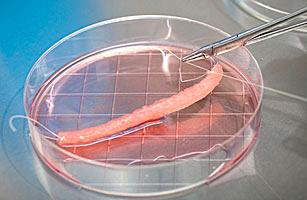The Centers for Disease Control and Prevention (CDC) estimates that prostate cancer afflicts 13 out of every 100 American men. In fact, it presents as the most common cancer diagnosis among men with the exception of non-melanoma skin cancer. These statistics reveal a desperate need for extensive research into the molecular mechanisms of prostate cancer.
At NC State, members of the Simpson Laboratory examine the mechanisms of prostate cancer conducive to invasive progression. This laboratory team, led by Dr. Melanie Simpson, seeks to determine which tumor characteristics contribute to a cancer’s metastatic potential.
Sophie Korenek, a third-year studying biochemistry, assists with a project on appropriate treatment determinants for prostate cancer patients. Her initial research encounter occurred on NC State’s campus where she arrived as a first-year.
“I don’t come from an area where people do research, but everyone told me that it was one of the coolest things about going to NC State,” Korenek said. “There’s so much research here — so many people doing different things. It’s definitely a key opportunity.”
Korenek credits the Simpson Laboratory with preparing her for a career in biomedical research and clinical practice.
“I started at the lab during COVID-19 when a lot of your typical laboratory experiences were moving online,” Korenek said. “So, I didn’t have the chance to try out different lab techniques until I started my undergraduate research. Now, I’m able to do biochemical experiments and form an understanding of the techniques beyond the theoretical.”
Simpson Laboratory uses translation research which refers to the conversion of laboratory findings into a format consistent with their practical application.
Korenek said the connection between her classroom instruction and lab procedure inspired her passion for biochemical methods.
“In class, we learned about how an experiment operates under perfect conditions — an ‘ideal model,’” Korenek said. “And then, when you’re in the lab, you’re doing actual experiments where you learn about different pathways that an experiment can take. It’s a lot more complicated than our classroom scenarios.”
She then elaborated on the benefits of conducting undergraduate research on her coursework.
“[Research] serves as a supplement for the conceptual theories that we have already learned,” Korenek said. “You really get that practical application within the lab setting.”
In the Simpson Laboratory, Korenek starts her work day with an agenda.
“First, we make a plan. What are we going to do for the day?” Korenek said. “We do any math that we need to do, any calculations.”
From there, Korenek preps her station where she documents her interactions with mammalian cells.
“If it’s a cell culture day, then I go to the cell culture room where I work under the hood to keep everything sterile,” Korenek said. “I’ll feed my cells, split my cells and run experiments on the cells.”
The experiments Korenek performs involve special proteins that reveal certain qualities of the cells.
“We take our cells and extract proteins from them. That’s a multi-day process,” Korenek said. “Once we take out the proteins, we analyze them. I call those ‘protein analysis days.’”
On protein analysis days, Korenek records the state of the extracted proteins.
“Proteins have, or rather, they take a lot of different configurations,” Korenek said. “One protein could have a ton of activities or pathways. That’s what we’re interested in.”
According to Korenek, the laboratory targets those proteins with antibodies that have a fluorescent marker on them — either green or red.
“We use some really sophisticated imaging techniques to take a picture of the fluorescent markers once you have analyzed them,” Korenek said. “Based on that image, we know how much protein is there. Then, we compare protein levels to other markers of metabolites in the cell which tells us what state that cell is in.”
The results of this imagery inform the laboratory’s knowledge of localized cell characteristics which, in turn, helps their understanding of the molecular mechanisms of a culture. This information will assist researchers in defining metastatic potential of prostate cancer.
In the future, Korenek plans to attend medical school. She thanks the Simpson Laboratory for helping her to confirm her intentions to pursue that track.














